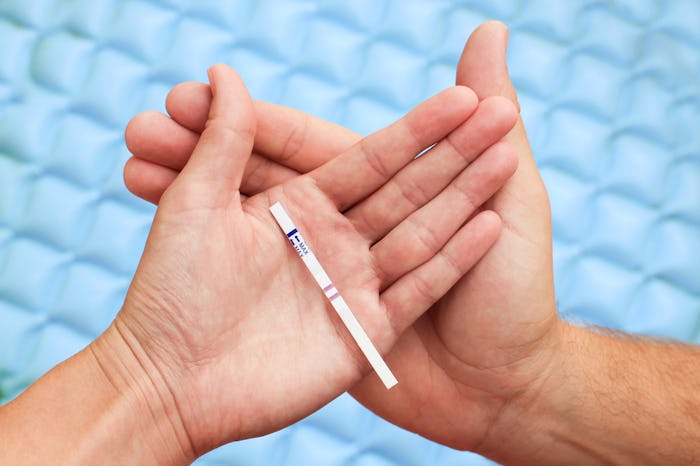Life

Can You Have A Positive OPK And Not Ovulate? Fertility Specialists Weigh In
While sex, fertility, and general health are the most crucial elements in your baby-making journey, technology, as always, promises to speed things along. You can purchase an ovulation predictor kit (OPK) at your local drug store that claims "getting pregnant can be as easy as good timing." But how accurate are these tests, and can they in fact help you get pregnant? Can you have a positive OPK and not ovulate? Romper reached out to fertility specialists for an expert opinion, because ovulation tests aren't cheap (for the price, you could buy 4.6 steak burritos at Chipotle).
According to Dr. Jennifer Hirshfeld-Cytron of Fertility Centers of Illinois, ovulation predictor kits "take the guess work out of trying to conceive," and can absolutely help you get pregnant. In general, Hirshfeld-Cyrton notes, the test are reliable — but abnormal cases exist. OPKs test the levels of luteinizing hormone in your urine, points out Dr. Edward Marut, also of Fertility Centers of Illinois. He explains that if you have an "abnormal luteinizing hormone pattern," you can certainly get a positive OPK and not ovulate. And the reverse is also true — you might ovulate, but find no reflection of that in your test result.
Unlike Hirshfeld-Cytron, Marut doesn't wholeheartedly endorse the use of these tests, viewing them as relatively useless for women with normal cycles. If you can have a regular cycle lasting between 24 and 35 days, Marut's suggestion is to follow the "sex every other day rule." Marut explains:
"The only people who could benefit from using ovulation prediction kits are those who don’t have intercourse very often and need better timing, and those with unpredictable cycles. The latter group has the disadvantage of not knowing when to start or stop the testing, which can get pricey."
According to Marut, the sex every other day rule "comes from the observation that too frequent intercourse reduces sperm count, and having intercourse too seldom reduces the quality of sperm."
How do you know whether an OPK test will work for you? Dr. Zitao Liu, MD, PhD, of New Hope Fertility explained that women with polycystic ovarian syndrome (PCOS) or a reduced ovarian reserve (too few eggs) may get a false positive because of higher base levels of luteinizing hormones. If your test always comes up positive, Liu suggests looking "for higher density colors over a couple attempts. This could be an indication you are ovulating."
OPK products are breeding like rabbits on the shelves of your local store, but for Hirshfeld-Cytron, no test is better than another. So go ahead and grab the cheapest one.
Personally, I see the value of OPKs for women who travel often or work late, and for any couple who can't have sex every other day. I didn't use an OPK with my first baby, but if and when we try for another, I can totally see myself hitting up CVS as an exhausted parent wanting to make those intimate moments count.
Of course, this level of precise-pregnancy-planning isn't for everyone.
"If the kits are always positive on the same days and starting to drive you crazy, stop using them!" Hirshfeld-Cytron writes. "Ovulation prediction kits are meant to help when you’re trying for a baby, not create added anxiety to the process."
OPKs can be a useful tool in your conception journey, but they're just that — a tool — and an imperfect one. You can have a positive OPK and not ovulate, and vice versa. Frustrating? Sure, but what technology isn't? You'll have to give the test a try to see if it's right for you. But please note: if you're over 35 and have been trying to conceive for six months without success — or under 35 and trying for a year or more — an ovulation prediction kit is no replacement for a visit to your friendly local fertility specialist.